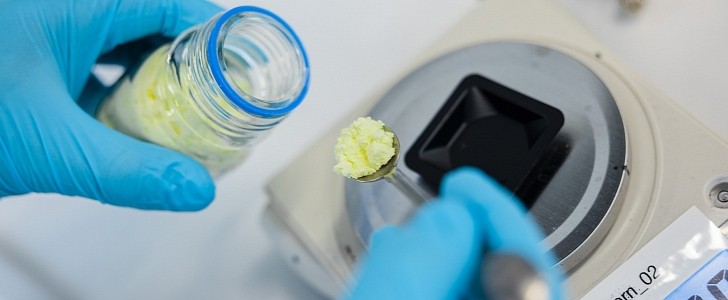Right now, the goal of our society is to limit the use of fossil fuels as part of our energy mix and industrial future. The move might be good and bad at the same time, as this risks cutting away the primary source of sulfur, a mineral used in many fields, including mining critical battery materials.
Sulfur might not spring to mind as a pillar of our society, but it is indeed vital for many activities. From agriculture to mining and possibly even direct use in battery production in a not-so-distant future, sulfur is at the base of our society. As the main component of sulfuric acid, it is a critical material used in fertilizers. It is also used to separate heavy metals from ore, including raw materials used to make EV batteries, like nickel and cobalt.
As you can see, sulfur is a critical component that propels our sustainable future by enabling electric mobility. Logically, we will need more of it as we progress toward electrification and want to build more electric vehicles and batteries. Today, the world uses 246 million tonnes of sulfuric acid a year. According to a paper published in The Geographical Journal, the sulfur necessity will reach 400 million tonnes by 2040
The funny thing is that the same electric mobility that saves our planet threatens to disrupt sulfur production with dire consequences. That’s because the most efficient and environmentally-friendly way we know to produce sulfur is as a byproduct of oil refining. As dirty as it sounds, the process is way cleaner than mining. With fossil fuels phasing out, more refineries will close, and there will be less and less sulfur resulting from oil refining.
The alternative is an old way, tremendously damaging to the environment. It involves pumping superheated water into the sulfur-containing mineral deposit. The sulfur then melts and bubbles up to the surface. The process, used until the late ’50s to extract sulfur, poses a health risk for workers and leads to contamination of the surrounding environment with wastewater containing hydrogen sulfide. Not to mention that all readily available sulfur deposits were depleted decades ago.
It’s not a single solution to sulfur shortages. In some fields, recycling can help reduce the need for more sulfur. In others, including EV battery production, the reliance on sulfur can be reduced by transitioning to more efficient chemistries that don’t use rare metals like nickel and cobalt. Despite a lower energy density, LFP batteries proved a worthy alternative to NCA/NCM cells. We don’t know what the future will have in store, but weaning off fossil fuels will undoubtedly have both good and bad side effects.
As you can see, sulfur is a critical component that propels our sustainable future by enabling electric mobility. Logically, we will need more of it as we progress toward electrification and want to build more electric vehicles and batteries. Today, the world uses 246 million tonnes of sulfuric acid a year. According to a paper published in The Geographical Journal, the sulfur necessity will reach 400 million tonnes by 2040
The funny thing is that the same electric mobility that saves our planet threatens to disrupt sulfur production with dire consequences. That’s because the most efficient and environmentally-friendly way we know to produce sulfur is as a byproduct of oil refining. As dirty as it sounds, the process is way cleaner than mining. With fossil fuels phasing out, more refineries will close, and there will be less and less sulfur resulting from oil refining.
The alternative is an old way, tremendously damaging to the environment. It involves pumping superheated water into the sulfur-containing mineral deposit. The sulfur then melts and bubbles up to the surface. The process, used until the late ’50s to extract sulfur, poses a health risk for workers and leads to contamination of the surrounding environment with wastewater containing hydrogen sulfide. Not to mention that all readily available sulfur deposits were depleted decades ago.
It’s not a single solution to sulfur shortages. In some fields, recycling can help reduce the need for more sulfur. In others, including EV battery production, the reliance on sulfur can be reduced by transitioning to more efficient chemistries that don’t use rare metals like nickel and cobalt. Despite a lower energy density, LFP batteries proved a worthy alternative to NCA/NCM cells. We don’t know what the future will have in store, but weaning off fossil fuels will undoubtedly have both good and bad side effects.







